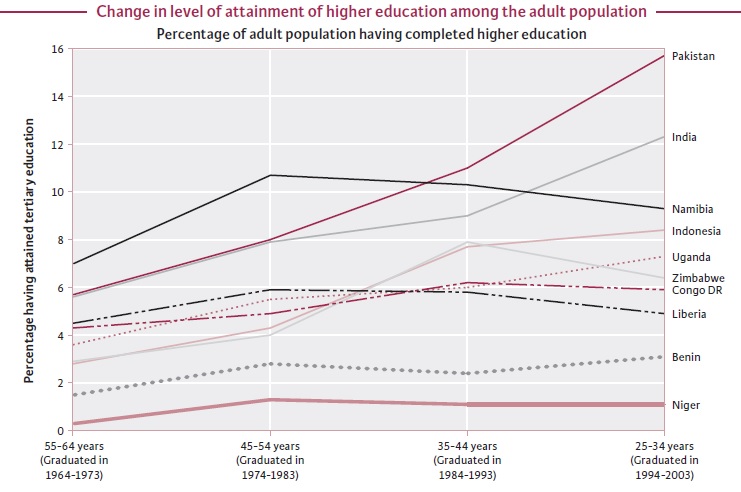A 12-year-old Pakistani girl is taking advance online classes offered by Stanford University. The youngest Microsoft certified professional is a Pakistani. Young Pakistanis are setting records with straight A's on O level and A level Cambridge courses. These frequent reports offer anecdotal evidence of Pakistan's growing human capital. Such evidence is also supported by data reported by various researchers and organizations.
With nearly 16% of its population in 25-34 years age group having college degrees, Pakistan is well ahead of India and Indonesia, according to Global Education Digest 2009 published by UNESCO Institute of Statistics. UNESCO data also shows that Pakistan's lead is growing with younger age groups.
By comparison, a little over 12% of Indians and 9% of Indonesians in 25-34 years age group have completed tertiary education. In 35-44 years age group, 11% of Pakistanis, 9% of Indians and 8% of Indonesians have completed college education. The report shows that 3% of Pakistanis and 1% of Indians have completed tertiary education abroad.
Harvard University researchers Robert Barro and Jhong-wa Lee offer similar insights into educational attainment in Asia and the rest of the world. As of 2010, there are 380 (vs 327 Indians) out of every 1000 Pakistanis age 15 and above who have never had any formal schooling. Of the remaining 620 (vs 673 Indians) who enrolled in school, 22 (vs 20 Indians) dropped out before finishing primary school, and the remaining 598 (vs 653 Indians) completed it. There are 401 (vs 465 Indians) out of every 1000 Pakistanis who made it to secondary school. 290 (vs 69 Indians) completed secondary school while 111 (vs. 394 Indians) dropped out. Only 55 (vs 58 Indians) made it to college out of which 39 (vs 31 Indians) graduated with a degree.
Another important point to note in Barro-Lee dataset is that Pakistan has been increasing enrollment of students in schools at a faster rate since 1990 than India. In 1990, there were 66.2% of Pakistanis vs 51.6% of Indians who had no schooling. In 2000, there were 60.2% Pakistanis vs 43% Indians with no schooling. In 2010, Pakistan reduced it to 38% vs India's 32.7%.
Pakistan's human capital development has been driven over the years starting with the Green Revolution technologies in 1960s to nuclear development program in 1980s and information and telecom revolution in 2000s. More recently, there has been growing interest in biotechnology and robotics. Completion of the first human genome project has spawned more than 200 life sciences departments at Pakistani universities. US drones have angered and fascinated many in Pakistan to go into robotics at 60 engineering colleges and universities in Pakistan. These revolutions have inspired large numbesr of young Pakistanis to study courses in business and STEM (Science, Technology, Engineering and Math) fields and swell the ranks of scientists and professionals.
Clearly, both India and Pakistan have made significant progress on the education front in the last few decades. However, the Barro-Lee dataset confirms that the two South Asian nations still have a long way to go to catch up with the rapidly developing nations of East Asia and the industrialized world. Huge investments made in higher education during Musharraf years helped hundreds of thousands of students to benefit from the doubling of the number of universities from 71 in 2002 to 137 now. It's now the responsibility of Pakistan's civilian leadership to sustain that momentum.
Faster economic growth requires BOTH skilled manpower and investment of dollars as Pakistanis saw during Musharraf years. Regardless, the growth of human capital is a good thing to build a foundation for Pakistan's future. It'll contribute to economic growth when the security situation improves and FDI returns to Pakistan. The country's large diaspora too will be helpful in accelerating Pakistan's growth and development with money and skills.
Haq's Musings: Human Capital Growth in Pakistan













